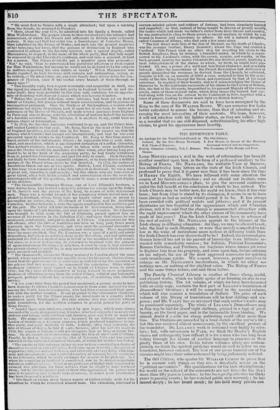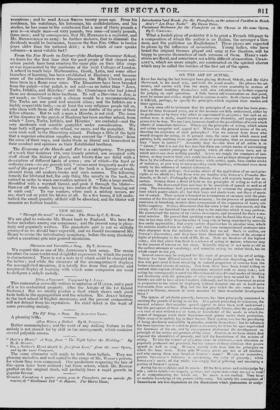Ireland. By the Rev. Henry Newland, A Few Words in
favour of the Hackney
LORD MOUNTCASHEL'S zeal in the work of reformation has brought another assailant upon him, in the form of a professed auxiliary to the Bishop of FERNS. Mr. NEWLAND, the veritable Vicar of Bannow, has indited twelve long letters on the state of the Irish Church, and professed to prove that it is purer now than it has been since the time of HENRY the Eighth. We have followed with some attention the course of his historical induction ; and we should not hesitate, were we in Lord MOUNTCASHEL'S place, to give the reverend controver- sialist the full benefit of the conclusion at which he has arrived. The Irish Church may be better now, for aught we know, than it has ever been ; but from what is stated by its champion, it seems to us to have been always as bad as society would permit it to be. It has always been crowded with political zealots and jobbers ; and if its present dignitaries are less forgetful of the appearances which suit Cl iris! ian divines, will it be said that the change is unconnected altogether with the rapid improvement which the other classes of the community have made of late years ? Has the Irish Church ever been in ademice of the rest of society ? Mr. NEWLAND appeals to the labours of the Irish clergy in diffissing education : did they, we may be allowed to ask, take the lead in such attempts ; or were they merely compelled to fol- low in the wake of institutions more zealous in diffusing truth than the Irish Church has ever shown itself to be ? Indeed, the reverend gen- tleman himself has not in his pursuit of knowledge been hitherto re- warded with remarkable success ; for Infidels, Political Economists, Roman Catholics, and Puritans, are bugbears whose names yet serve to frighten him from his propriety, and force upon him, before entering on his subject, the use of the most approved exorcisms for quieting such troublesome spirits. We cannot, however, permit ourselves to enlarge on Mr. NEws.ssro'S lucubrations, in which we either see nothing new, or nothing of the slightest value. The Bishop of FERNS said the same things before, and said them better.
The Family Classical Library is another of those cheap, useful, and elegant works, which we lately spoke of as forming an aura in our publishing history. The I st volume, of which we have been favoured with an early copy, contains the first part of LE LAND'S translation of Demosthenes' Orations ; it will lie completed in the second volume, which will also contain a translation of Sallast. The price of each volume of this library of translations will be four shillings and six- pence ; and Mr. VALPY has so arranged that each author's works may be purchased separately. The whole of LELAND'S Denzosthcnes- may in this way be had for about eight shillings, printed in a type of great beauty, on the finest paper, and in the fashionable linen binding. We almost doubt if a club for cheap publishing could effect more than this. The Orations are preceded by a brief sketch of the orator's life ; but this was rendered almost unnecessary, by the excellent prof tce of the translator. Dr. LELAND'S work is esteemed very highly by scho- lars ; but, with submission to PARR, we think the Doctor's English shows not unfrequently how difficult it is for a man who has long been toiling through the idioms of another language to preserve in their purity those of his own. In his future volumes (forty are contem- plated), we think the spirited publisher would do well to follow no one translator, however eminent. The best of our prose translations of the classics might have their value enhance.d by being judiciously collated.
The Old Citizen, who quotes Sir WILLIAM CURTIS to prove that Ire is content with things as they are, is dreadfully severe on the " political economists." His qualifications for the task of enlightenin_ the world on the sukeet of the economists are not few,—he has live j more than fifty years in London ; he has been pretty attentive for thirty years to passing events ; he has watched public men narrowly ; he has mused deeply; he has heard much; he has held many private con versations ' • and he read ADAM SMITH twenty years ago. From his residence, his watchings, his listenings, his confabulations, and his studies, he has come to theconclusion that a man of thirty pounds a year is—a single man—of sixty pounds, two men—of ninety pounds, three men ; and by consequence, that Mr.HERRIES is a regiment, and Mr. ROTHSCHILD an army: he further declares, that to diminish the dividends would be barbarous, because the Sun Fire Office is twelve years older than the national debt ; a fact which at once speaks volumes—a most voluble fact !
- From the Few Words in Defence of the Hackney Grammar School, we learn for the first time that the good people of that elegant sub- urban parish have beer enacting the same play on their little stage as was represented by the partisans of the rival Colleges of London. A school to teach boys Mathematics, Greek, Latin, and some other branches of learning, has been established at Hackney ; and because some of the subscribers were Dissenters, the High Church people have been in a flame ever since. The Dissenters have been branded from the pulpit—what pulpit, is not said—as no better than " Jews, Turks, Infidels, and Heretics ;" and the Churchmen who had joined them are denounced as false brethren. To call a Dissenter a Jew, is not much ; on 'Change such a charge would be a recommendation. The Turks are our good and ancient allies ; and the Infidels are a highly respectable body,—so at least the very religious people tell us, who class with them all the rich and nine-tenths of the poor of their fellow citizens. But to call a man a Heretic, is not civil. The issue of the disputes in the parish of Hackney has been another school, from which " Jews, Turks, Infidels, and Heretics " are excluded—and the very moderate and sensible pamphlet under consideration. We hope both will prosper—the school, we mean, and the pamphlet. We even wish well to the Dissenting school. Perhaps a little of the light that a superior education supplies, may convert the " Heretics" from the error of their ways, and make them as liberal and benevolent in their conduct and opinions as their Established brethren.
The Economy of the Hands and Feet is a catchpenny. Ten pages of a work that numbers 108, very loosely printed, are occupied with Stuff about the history of gloves, and twenty-four are filled with a description of different kinds of corns ; one of which—the hard or ordinary corn—we are gravely told, " occurs most frequently under the nail V the great toe !" The rest of the book is a farrago of trash, gleaned from old cookery-books and such sources. The following remedy for blistered feet, the only thing like novelty in the book, we extract in order to warn our readers a_-ainst it. "Take a large needle, threddled with a worsted thread, and push it through the blister— then cut off the needle leaving two inches of the thread hanging out at each end." To our readers, when such a mishap occurs, we say, don't cut or prick the blister at all. In a few hours, if left undis- turbed, the small quantity of fluid will be absorbed, and the blister will occasion no further trouble.



















 Previous page
Previous page